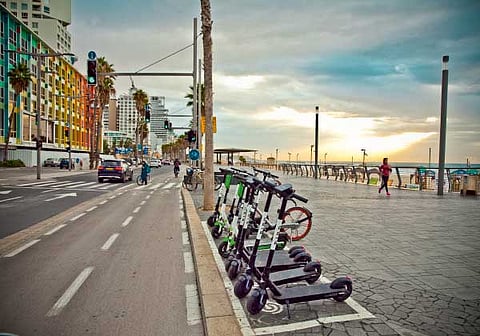

SHARED ELECTRIC SCOOTERS TO BE EQUIPPED WITH LICENSE PLATES AND HELMETS
Tel Aviv becomes the first city in the world to require all shared electric scooters for hire to be equipped with license plates and helmets
The Tel Aviv-Yafo Municipality has issued new regulations for shared electric scooter companies in order to keep pedestrians and riders safe. The new regulations include equipping electric scooters with helmets, installing license plates, recycling used batteries, lowering the speed of the scooters in certain areas, and preventing the usage of scooters in restricted areas. The regulations enforced by the Tel Aviv-Yafo Municipality are unprecedented and are meant to set an example for other municipalities around the world who are dealing with similar circumstances.
In August 2019, the municipality embarked on a pilot to regulate companies that were renting out electric scooters in the city. These companies had been subjected to a number of conditions and restrictions in order to obtain a permit to operate in the city, which included ensuring availability throughout the city, limiting the maximum number of scooters per company to 2,500 units, allowing parking only in designated areas which have to be marked in the companies' apps, preventing usage by minors, implementing and activating a service call center, and banning the scooters' alarms during the night-time.
Looking ahead to 2020, the municipality has decided to continue with this pilot, adding additional terms and restrictions with the purpose of increasing road safety and maintaining public order in the future.
Meital Lehavi, Deputy Mayor of Tel Aviv-Yafo for Transportation: "Our main goal is to keep sidewalks as a safe space for walking, as the city's sidewalks are designed primarily for pedestrians. Tel Aviv is a very walkable city and we encourage people to take advantage of the city's small size, flat topography and over 300 days of sunshine a year."
Below are additional rules for shared scooters, in public areas, that will take effect in 2020:
Wearing Helmets
The Tel Aviv-Yafo Municipality recognizes the importance of wearing helmets to keep riders safe and to reduce the chances of serious injuries. As a result of research, work, and consultation with relevant authorities, the municipality has decided that companies renting out electric scooters in the city must attach helmets to their electrical scooters. Given the complexity of implementing this task, the deadline for achieving this goal is June 15, 2020.
Restricted Travelling Areas
Electrical scooters will not be allowed in pedestrian-only zones (for example the wooden deck at the Tel Aviv Port). Furthermore, scooters will automatically be shut down when entering these areas. This regulation will be implemented by February 1, 2020.
Traffic Moderating Areas
The speed of electric scooters will automatically be limited to 15 km/h in areas where the municipality has detected a high volume of friction between pedestrians and scooter riders. This regulation will be implemented by February 1, 2020.
License Plates
Companies that rent scooters in Tel Aviv are required to put a license plate on all their scooters. In addition, and in order to eradicate the phenomenon of riding scooters on the sidewalks, the municipality will allow the general public to use the collaborative municipal 106 apps to report users riding on the sidewalk. This regulation will be implemented by January 1, 2020.
Parking in Restricted Areas
The municipality is expanding the areas where scooters will be prohibited outside of designated parking spaces. Another 180 parking spaces were marked around the city along with the approximately 220 existing designated parking spaces. Users will not be able to end their ride nor lock the scooters outside the designated parking spaces. This regulation will be implemented by January 1, 2020.
Recyclable Battery
The municipality will require the shared electric scooter companies to recycle the batteries of discontinued scooters in order to prevent the harmful environmental impact of e-waste. This regulation will be implemented by January 1, 2020.
Follow us on Google News
